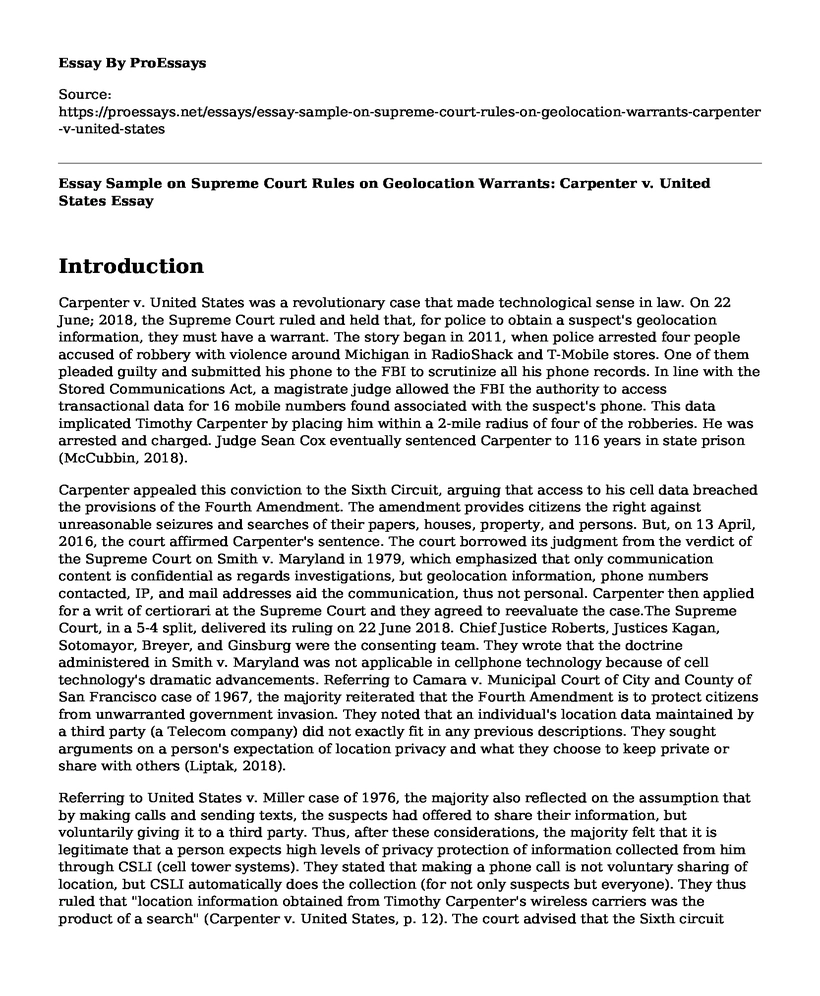Introduction
Carpenter v. United States was a revolutionary case that made technological sense in law. On 22 June; 2018, the Supreme Court ruled and held that, for police to obtain a suspect's geolocation information, they must have a warrant. The story began in 2011, when police arrested four people accused of robbery with violence around Michigan in RadioShack and T-Mobile stores. One of them pleaded guilty and submitted his phone to the FBI to scrutinize all his phone records. In line with the Stored Communications Act, a magistrate judge allowed the FBI the authority to access transactional data for 16 mobile numbers found associated with the suspect's phone. This data implicated Timothy Carpenter by placing him within a 2-mile radius of four of the robberies. He was arrested and charged. Judge Sean Cox eventually sentenced Carpenter to 116 years in state prison (McCubbin, 2018).
Carpenter appealed this conviction to the Sixth Circuit, arguing that access to his cell data breached the provisions of the Fourth Amendment. The amendment provides citizens the right against unreasonable seizures and searches of their papers, houses, property, and persons. But, on 13 April, 2016, the court affirmed Carpenter's sentence. The court borrowed its judgment from the verdict of the Supreme Court on Smith v. Maryland in 1979, which emphasized that only communication content is confidential as regards investigations, but geolocation information, phone numbers contacted, IP, and mail addresses aid the communication, thus not personal. Carpenter then applied for a writ of certiorari at the Supreme Court and they agreed to reevaluate the case.The Supreme Court, in a 5-4 split, delivered its ruling on 22 June 2018. Chief Justice Roberts, Justices Kagan, Sotomayor, Breyer, and Ginsburg were the consenting team. They wrote that the doctrine administered in Smith v. Maryland was not applicable in cellphone technology because of cell technology's dramatic advancements. Referring to Camara v. Municipal Court of City and County of San Francisco case of 1967, the majority reiterated that the Fourth Amendment is to protect citizens from unwarranted government invasion. They noted that an individual's location data maintained by a third party (a Telecom company) did not exactly fit in any previous descriptions. They sought arguments on a person's expectation of location privacy and what they choose to keep private or share with others (Liptak, 2018).
Referring to United States v. Miller case of 1976, the majority also reflected on the assumption that by making calls and sending texts, the suspects had offered to share their information, but voluntarily giving it to a third party. Thus, after these considerations, the majority felt that it is legitimate that a person expects high levels of privacy protection of information collected from him through CSLI (cell tower systems). They stated that making a phone call is not voluntary sharing of location, but CSLI automatically does the collection (for not only suspects but everyone). They thus ruled that "location information obtained from Timothy Carpenter's wireless carriers was the product of a search" (Carpenter v. United States, p. 12). The court advised that the Sixth circuit rehear Carpenter's case. In June 2019, the Sixth circuit decided against Carpenter once again and sentenced him to 116 years imprisonment.
I support the majority decision because, as much as police officers act in good faith to obtain data to help them in doing their job well, they are at times too pervasive, and thus need some roadblocks to such kind of permeation on personal information. By being compelled to obtain a warrant, citizens can be sure that the decision to get their data was a well-considered one and will be done in a restricted manner.
References
"Carpenter v. United States". scotusblog.com. Retrieved October 25, 2019.
Liptak, A. (2018). Defending Privacy, Supreme Court Says Warrants Generally Are Necessary to Collect Cell Phone Data." The New York Times. Retrieved October 25, 2019.
McCubbin, S. (2018). The Supreme Court Rules in Carpenter v. United States. Retrieved 26 October 2019, from https://www.lawfareblog.com/summary-supreme-court-rules-carpenter-v-united-states
Cite this page
Essay Sample on Supreme Court Rules on Geolocation Warrants: Carpenter v. United States. (2023, Feb 27). Retrieved from https://proessays.net/essays/essay-sample-on-supreme-court-rules-on-geolocation-warrants-carpenter-v-united-states
If you are the original author of this essay and no longer wish to have it published on the ProEssays website, please click below to request its removal:
- Strategies to Achieve Each Goal Essay
- Justice: What's the Right Thing to Do?
- Mass Incarceration in the United States Essay
- Restorative and Community Justice Paper Example
- The Death Penalty in the US Research
- Expository Essay on Social Justice and Diversity in the US
- Essay Example on Terrorism: Over 100 Definitions and Differences in Opinion







